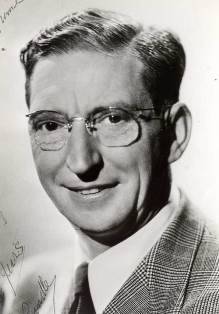Frank Randle
Frank Randle | |
|---|---|
 | |
| Born | Arthur Hughes 30 January 1901 Aspull, England |
| Died | 7 July 1957 (aged 56) Blackpool, England |
| Occupation | Comedian/Comic actor |
| Spouse | May Annie Victoria Douglas |
Frank Randle (born Arthur Hughes, also known as Arthur McEvoy or Arthur Twist; 30 January 1901 – 7 July 1957) was an English comedian.[1] A contemporary of fellow Lancastrians George Formby and Gracie Fields, he was regarded as more subversive.[2]
Life and career
Randle was born in Aspull, near Wigan, Lancashire, to an unmarried Rhoda Heathcoate Hughes. He left school aged 13 and worked in menial jobs until two years later when he joined an acrobatic troupe.[3] He took the name Arthur McEvoy after his mother married Richard McEvoy. In 1928, Randle began to tour as a comedian, principally in Lancashire and Northern England.[4] Randle appeared on stage carrying a red warning lamp, similar to the type found around road works, declaring "Look what some dam'd fool left in’t road".[5] He developed his own show, Randle's Scandals, which in the 1950s featured Roy Castle.[6]
Randle's mischievous wit led to a running conflict with Harry Barnes, a police chief of the Lancashire seaside resort of Blackpool, who frequently banned him from performing in the town's venues. He was prosecuted in 1952 on four charges of obscenity and fined £10 on each count.[7] Randle responded to his critics in robust fashion, frequently throwing his false teeth into the audience and once bombarding Blackpool from an aeroplane with toilet rolls (according to an episode of Rude Britannia, broadcast by the BBC on 15 June 2010, the toilet roll bombardment actually took place over Accrington, not Blackpool).[8] Randle's police charge sheet is lodged with Lancashire Archives.[9]
On the outbreak of the Second World War, having failed his medical to join the RAF, Randle joined the Home Guard and established a career in film. His iconoclastic portrayal of the underdog, flouting authority and disrupting the establishment, found a ready audience in a population suffering the privations of war. He took equity in John E. Blakeley's Manchester-based Mancunian Film Studios, appearing in eight of its productions. In his last film, It's a Grand Life (1953), his co-star was Diana Dors.[10]
With the decline of Variety in the 1950s, Randle's career declined. Pressed by debts and tax arrears, and suffering from the consequences of a life of alcohol abuse, he was made bankrupt by the tax authorities in 1955.[2] He died in Blackpool of gastroenteritis in 1957 and is buried in Carleton Cemetery, Blackpool.[11]
He had married May Annie Victoria Douglas, known as Queenie, in 1928 in Greenwich, London. There were no children but Manchester artist Arthur Delaney was alleged to be Randle's illegitimate son by fellow performer Genevieve Delaney (also known as Eve Delaney).
Randle's comedy achievement was celebrated in "Grin up North", a major touring exhibition that looked at the unique Northern sense of humour. He was most recently featured in an episode of BBC 4's Rude Britannia shown in June 2010.[2]
In 2007, a celebratory plaque paid for by members of the Cuthbert Club was unveiled to Randle on Blackpool's North Pier.[12] In 2010, the same organisation paid for the refurbishment of Randle's gravestone, which was unveiled in July 2010.
Filmography
- Somewhere in England (1940)
- Somewhere in Camp (1942)
- Somewhere on Leave (1943)
- Somewhere in Civvies (1943)
- Home Sweet Home (1945)
- Holidays with Pay (1948)
- When You Come Home (1948)
- Somewhere in Politics (1949)
- School for Randle (1949)
- It's a Grand Life (1953)
References
- ^ "Frank Randle".
- ^ a b c Wareham, Mark (16 February 1994). "Perfectly Frank: Frank Randle eschewed the stereotyped comedy". The Independent. Retrieved 12 July 2022.
- ^ "Frank Randle & Josef Locke".
- ^ "mislaid-comedyheroes".
- ^ Mather (2003), p. 19
- ^ "Leave 'em Laughing: The Roy Castle Story – BBC Radio 4 FM – 13 March 2005 – BBC Genome".
- ^ Kynaston, David (2009). Family Britain 1951-7. London: Bloomsbury. p. 109. ISBN 9780747583851.
- ^ Moore, Charles (28 June 2010). "A largely academic view of British bawdy". The Telegra[ph. Retrieved 12 July 2022.
- ^ Lancashire Archives, PLA, accession 6401
- ^ "It's a Grand Life (1953) – John E. Blakeley – Synopsis, Characteristics, Moods, Themes and Related – AllMovie".
- ^ "Frank Randle (1901–1957) – Find A Grave Memorial".
- ^ "Frank Randle blue plaque".
Bibliography and further reading
- Mather, Geoffrey (2003), Tacklers' Tales: A Humorous look at Lancashire, Palatine Books, ISBN 978-1-874181-19-4
- Nuttall, J. (1978) King Twist, ISBN 978-0710089779
- Fisher, J. (1973) Funny Way to be a Hero, ISBN 978-1848093133
- Band, B. (1995) Blackpool's Comedy Greats
- Richards, J. (1994) Stars in our Eyes
- Montgomery, J. (1954) Comedy Films : 1894–1954, ISBN 9780047910180
- Mellor, J. G. (1982) They Made us Laugh, ASIN: B00SLS58X2
- Williams, Philip Martin; Williams, David L (2006). Wired to the Moon: Frank Randle - A Life. History on Your Doorstep. ISBN 978-0-9518012-5-3.
- Williams, Philip Martin; Williams, David L (2011). The Theatrical World of Arthur Twist: The Early Career of Frank Randle. History on Your Doorstep. ISBN 978-0-9518012-7-7.
External links
- Frank Randle at IMDb
Lua error in Module:Authority_control at line 182: attempt to index field 'wikibase' (a nil value).
- Pages with script errors
- Articles with short description
- Articles with hatnote templates targeting a nonexistent page
- Use dmy dates from February 2022
- Articles with invalid date parameter in template
- Use British English from August 2012
- 1901 births
- 1957 deaths
- People from Aspull
- People from Wigan
- British male comedy actors
- English male comedians
- English male stage actors
- English male film actors
- English male screenwriters
- 20th-century English male actors
- 20th-century English comedians
- 20th-century English screenwriters
- 20th-century English male writers
- British Home Guard soldiers
